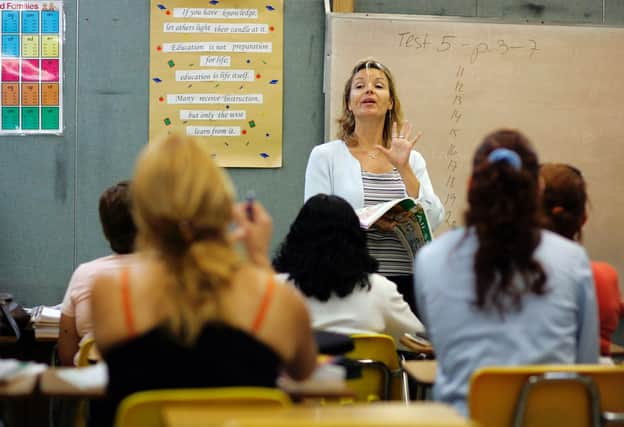Scottish education: Curriculum for Excellence should have a place for kindness – Cameron Wyllie


Astonishingly they describe it as a “thought paper” – it’s difficult to imagine a more Orwellian term – and it’s called “Exploring the Four Capacities”. This paper was, I kid you not, produced – no doubt at some significant cost – by a firm called “NoTosh”. Lol.
The four capacities, as you will recall, are the foundation of Curriculum for Excellence, that vague structure under which Scottish education has laboured for the past dozen years, and which last year’s Organisation for Economic Co-operation and Development (OECD) report suggested wasn’t working in practice. It’s now possible to be in sixth year and have had CfE as the basis of your education for as long as you’ve been at school.
Advertisement
Hide AdAdvertisement
Hide AdAnd yet, having spoken to 600 young people at various school stages, during the first five months of this year, the report finds “that the majority hadn’t heard of the four capacities. Sixty per cent hadn’t heard of them at all, and over 20 per cent more weren’t sure”. This will be a huge surprise only to Education Scotland, and not at all to those actually doing the educating in our schools, but anyway, let me refresh your memories about these four capacities because I believe it’s time to consider what it is exactly that CfE wants.
They are “Successful Learner”, “Effective Contributor”, “Responsible Citizen” and “Confident Individual”. That, apparently, is what we want our young people to be in Scotland – successful, effective, responsible, confident. I think most parents (and teachers) would agree that these are desirable characteristics, particularly for a future employee.
I have no problem personally with accepting that education has a lot to do with work, but it’s also got a lot to do with humanity, well-being and the wider world. I mean, let’s consider someone who is a confident, responsible, effective, successful person. Would you want them as an employee? Yes. An employer? Maybe. Your mother? Your mother-in-law? Your teacher? Your minister? Your friend?
Would you want a confident, responsible, effective, successful person holding your hand as you died? Wouldn’t you maybe want someone who was kind, caring, thoughtful, compassionate?
Actually, in this difficult world, the most important thing we should want for our children is that they should be kind. This notion is not an enormous pink marshmallow; it is not pie in the sky – it is absolutely vital for a nation and its people to be kind. In the ‘United Kingdom’ just now we have a Home Secretary who describes asylum seekers as "invaders”. That is a view which seems to me to be entirely without empathy… or indeed a legal basis.
Ah, you may say, can you teach empathy? Well, I think you can, but it’s much more about creating a school and a classroom environment where consideration for others and showing concern for less successful, confident individuals than yourself is cherished. Really, the current four capacities are far too focussed on the individual; even "responsible citizen” sounds more like the person who ensures his bin goes out at the right time than the person who checks in on his neighbour.
Our young people live complex lives, under the constant scrutiny of social media. They live in a society where things are getting tighter and tighter financially for most families, and where tensions on many topics run high. They are constantly (rightly) inundated with statistics that suggest that the world may be rushing towards an irrecoverable environmental precipice.
All of this makes some of them focus on the big picture while others engage in cyclical self-examination. Our school curricula are crammed with all sorts of novel training – in "mindset” and “mindfulness”, for example (research demonstrates that teaching these in schools has virtually no positive impact) – which are really very focused on the individual.
Advertisement
Hide AdAdvertisement
Hide AdWe need to concentrate much harder on concepts of friendship and society and community. We need schools where everyone is included and where ‘niceness’ works. We also, I should say, need to be ready to deal sharply with unkindness, particularly where the law is broken.
So it’s time, given the now amply evidenced fact that most young people don’t know anything about the current four capacities, to begin – as part of the review process which is currently taking place – to once again ask what qualities we want to encourage in our schools while the most important things – learning stuff and gaining skills – are happening. Of course I want our young people to be confident and responsible, but I also want them to be hardworking and resilient; I want them to look inward less and outward more. I want them to embody compassion, because somewhere in this grey-haired head of mine I have come to believe that the combination of productivity and kindness makes for happy young people.
The brilliant American writer George Saunders, giving a commencement address at Syracuse University a decade ago, concluded “it’s a little facile, maybe, and certainly hard to implement, but I’d say, as a goal in life, you could do worse that ‘try to be kinder.’”
I really hope, in 20 years or so, when the folks from NoTosh return, a very high percentage of our young people might say: “My school wants me to be compassionate.” Now I’m going to watch the John Lewis Christmas advert again.
Cameron Wyllie writes a blog called A House in Joppa; his book, Is There A Pigeon in the Room? My Life in Schools, is published by Birlinn
Comments
Want to join the conversation? Please or to comment on this article.